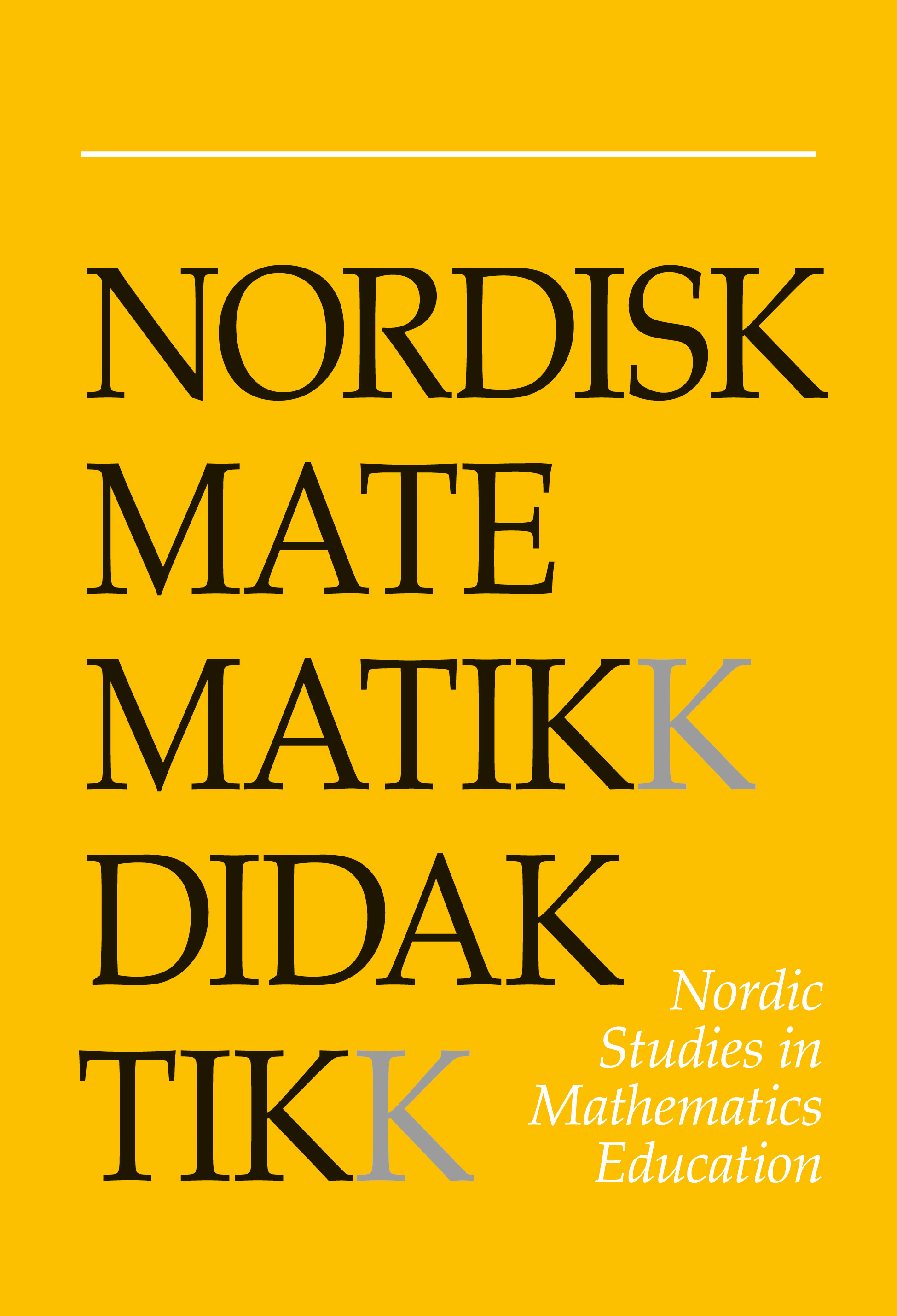Polish parents’ views on mathematics activities at home and in Swedish preschools
DOI:
https://doi.org/10.7146/nomad.v23i3-4.148978Abstract
This article describes the results of a digital survey of 41 Polish immigrant parents’ views on mathematics activities at home and at preschool as parents’ views potentially provide a range of perspectives on mathematics activities for young children. Parents were asked to describe and justify their views about how children engage with mathematical ideas and nominate activities that children engage in at home and at preschool. When parents justified their views about young children and mathematics, they tended to align themselves with the norms and values of the Swedish preschool curriculum. The findings suggest that parents, like children, are socialised into Swedish preschools. However, this alignment could limit possibilities for broadening perspectives about mathematics education in preschool, which could be available by incorporating input from immigrant parents’ different cultural and linguistic backgrounds.
References
Aubrey, C., Bottle, G. & Godfrey, R. (2003). Early mathematics in the home and out-of-home contexts. International Journal of Early Years Education, 11 (2), 91-103. https://doi.org/10.1080/09669760304708
Björklund, C. & Pramling, N. (2017). Discerning and supporting the development of mathematical fundamentals in early years. In S. Phillipson, A. Gervasoni & P. Sullivan (Eds.), Engaging families as children's first mathematics educators (pp. 65-80). Singapore: Springer. https://doi.org/10.1007/978-981-10-2553-2_5
Bottle, G. (1999). A study of children's mathematical experiences in the home. Early Years, 20 (1), 53-64. https://doi.org/10.1080/0957514990200106
Brenner, M. E. (1998). Adding cognition to the formula for culturally instruction in mathematics. Anthropology & Education Quarterly, 29 (2), 214-244. https://doi.org/10.1525/aeq.1998.29.2.214
Carruthers, E. (2006). Children's mathematics: making marks, making meaning. London: Paul Chapman. https://doi.org/10.4135/9781446213780
Civil, M., Bratton, J. & Quintos, B. (2005). Parents and mathematics education in a Latino community: redefining parental participation. Multicultural Education, 13 (2), 60-64.
Clements, D. H. & Sarama, J. (2007). Early childhood mathematics learning. In F. K. Lester (Ed.), Second handbook of research in mathematics teaching and learning (Vol. 1, pp. 461-555). Charlotte: Information Age.
Cohen, L., Manion, L. & Morrison, K. (2000). Research methods in education. London: Routledge.
Corsaro, W. A. (2005). The sociology of childhood (2 ed.). Thousand Oaks: Pine Forge Press.
Coyne, I. T. (1997). Sampling in qualitative research. Purposeful and theoretical sampling; merging or clear boundaries? Journal of advanced nursing, 26 (3), 623-630. https://doi.org/10.1046/j.1365-2648.1997.t01-25-00999.x
Ebrahim, H. (2011). Children as agents in early childhood education. Education as Change, 15 (1), 121-131. https://doi.org/10.1080/16823206.2011.568947
Edo, M., Planas, N. & Badillo, E. (2009). Mathematical learning in a context of play. European Early Childhood Education Research Journal, 17 (3), 325-341. https://doi.org/10.1080/13502930903101537
Giovannini, D. & Vezzali, L. (2011). Contact with immigrant parents as a predictor of teachers' attitudes and acculturation orientations toward immigrant children. International Journal about Parents in Education, 5 (2), 65-76. https://doi.org/10.54195/ijpe.18181
Hawighorst, B. (2005). Parents' views on mathematics and the learning of mathematics – an intercultural comparative study. ZDM, 37 (2), 90-100. https://doi.org/10.1007/BF02655718
James, A., Jenks, C. & Prout, A. (1998). Theorizing childhood. Cambridge: Polity Press.
James, A. & Prout, A. (2001). Constructing and reconstructing childhood: contemporary issues in the sociological study of childhood (Second ed.). London: Falmer.
Jönsson, I., Sandell, A. & Tallberg-Broman, I. (2012). Change or paradigm shift in the Swedish preschool? Sociologia, Problemas e Práticas, 69, 47-61.
Lee, N. (2001). Childhood and society: growing up in an age of uncertainty. Maidenhead: Open University.
Lembrér, D. (2015). Socialisation and mathematics education in Swedish preschools. In K. Krainer & V. Vondrov (Eds.), Proceedings of CERME 9 (pp. 1603-1609). Prague: Charles University.
Lembrér, D. & Meaney, T. (2015). Being and becoming as socialisation in a mathematical activity in preschool. Journal of Nordic Early Childhood Education Research, 11 (5), 1-14. https://doi.org/10.7577/nbf.992
Lunneblad, J. & Johansson, T. (2012). Learning from each other? Multicultural pedagogy, parental education and governance. Race Ethnicity and Education, 15 (5), 705-723. https://doi.org/10.1080/13613324.2011.624508
Melhuish, E. C., Phan, M. B., Sylva, K., Sammons, P., Siraj-Blatchford, I. & Taggart, B. (2008). Effects of the home learning environment and preschool center experience upon literacy and numeracy development in early primary school. Journal of Social Issues, 64 (1), 95-114. https://doi.org/10.1111/j.1540-4560.2008.00550.x
Phillipson, S., Gervasoni, A. & Sullivan, P. (Eds.). (2017). Engaging families as children's first mathematics educators: international perspectives. Singapore: Springer. https://doi.org/10.1007/978-981-10-2553-2
Prout, A. (2005). The future of childhood: towards the interdisciplinary study of children. London: Routledge Falmer.
Prout, A. (2011). Taking a step away from modernity: reconsidering the new sociology of childhood. Global studies of childhood, 1 (1), 4-14. https://doi.org/10.2304/gsch.2011.1.1.4
Qvortrup, J. (1994). Childhood matters: social theory, practice and politics (Vol. 14). Aldershot: Avebury.
Skolverket. (2016). Läroplan för förskolan Lpfö 98 reviderat 2016 [Curriculum for the preschool revised 2016]. Stockholm: Fritzes.
Statistics Sweden (2012). Finland vanligaste ursprungslandet för utrikes födda. Retreived from http://www.scb.se/sv_/Hitta-statistik/Artiklar/Finland-vanligaste-ursprungslandet-for-utrikes-fodda/
Streit-Lehmann, J. (2017). Involving parents in games and picture books. In S. Phillipson, A. Gervasoni & P. Sullivan (Eds.), Engaging families as children's first mathematics educators (pp. 147-163). Singapore: Springer. https://doi.org/10.1007/978-981-10-2553-2_9
Van Laere, K. & Vandenbroeck, M. (2017). Early learning in preschool: meaningful and inclusive for all? Exploring perspectives of migrant parents and staff. European Early Childhood Education Research Journal, 25 (2), 243-257. https://doi.org/10.1080/1350293X.2017.1288017
Wager, A. A. & Whyte, K. (2013). Young children's mathematics: Whose home practices are privileged? Journal of Urban Mathematics Education, 6 (1), 81-95. https://doi.org/10.21423/jume-v6i1a196
Downloads
Published
How to Cite
Issue
Section
License

This work is licensed under a Creative Commons Attribution-NonCommercial-ShareAlike 4.0 International License.



